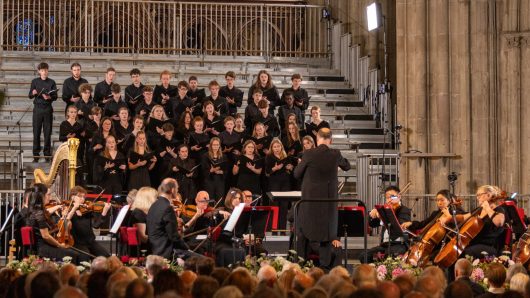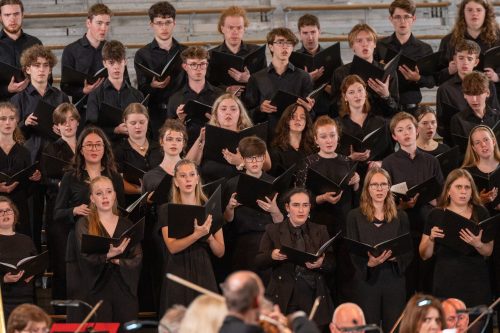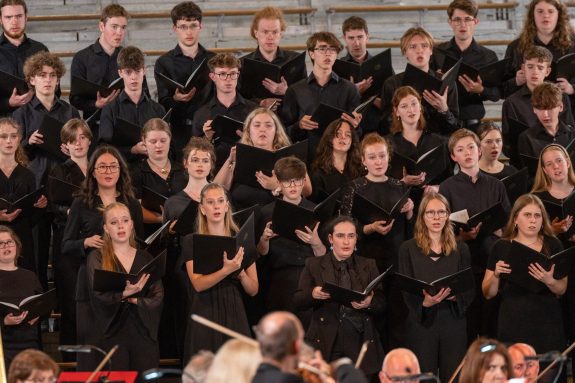 United Kingdom Three Choirs Festival [6] – McDowall, Stanford (arr. Dibble), Venables: Ben Cooper (narrator), Three Choirs Festival Youth Choir; Jonathan Hope (organ), Philharmonia Orchestra / Adrian Partington (conductor) Worcester Cathedral 2.8.2024. (JQ)
United Kingdom Three Choirs Festival [6] – McDowall, Stanford (arr. Dibble), Venables: Ben Cooper (narrator), Three Choirs Festival Youth Choir; Jonathan Hope (organ), Philharmonia Orchestra / Adrian Partington (conductor) Worcester Cathedral 2.8.2024. (JQ)

Cecilia McDowall – Shipping Forecast (2011)
Stanford (arr. Jeremy Dibble) – Sonata for String Orchestra (premiere)
Ian Venables – Requiem (2019)
The Three Choirs Festival Youth Choir was established in 2010 and it gives a concert at the Festival every year. It’s a great initiative, giving young singers (between the ages of 15 and 21, I believe) from the Festival’s catchment area an opportunity to work intensively with one of the cathedral Directors of Music on an interesting and challenging programme. Not only that, but the choir gets to give a concert with the Philharmonia Orchestra. I am sure all the singers have previous choral singing experience but they only come together as an ensemble in Festival week, so the time for preparation of music to a high standard is quite short. Forty-five singers were listed in the programme. For this concert they had been prepared by Gloucester Cathedral’s Director of Music, Adrian Partington.
The programme opened with a work by Cecilia McDowall, a composer whose choral music I very much admire. Shipping Forecast, which was commissioned by the Portsmouth Festival Choir, is a work I have not heard before: it was recorded some years ago by the conductor George Vass, but I have not heard the disc. It is a rather unusual composition, cast in three movements and scored for SATB choir and string orchestra. The central movement sets verses from Psalm 107 (‘They that go down to the sea in ships’). The outer movements are settings of poetry by Seán Street (b 1946). I think I am right in saying that these two creative artists have collaborated several times over the years; what I regard as the finest of the McDowall pieces for which Street has provided words is the intensely moving Standing as I do before God (2013), inspired by the execution of Edith Cavell in World War I. In Shipping Forecast, Street weaves into the first poem some text from that vital broadcasting institution, the UK Shipping Forecast. In the poem for the last movement, he brings in some words from the Canadian equivalent, CBC’s ‘The Fisheries Broadcast’.
The Youth Choir made a favourable impression right from the start of the first movement, ‘Donegal’. Their sound was fresh, the singing energised and confident. It was in this movement that we heard from the narrator, Ben Cooper, the Worcester City Chairman of Three Choirs Festival. At various points he read out the names of various shipping areas such as Fair Isle, Faroes and South East Iceland, names which many people will forever associate with the modulated and reassuring tones of BBC Radio 4’s Charlotte Green. Cooper was positioned in the pulpit and his voice could be heard clearly. The second movement is ‘They that go down to the sea in ships’. Again, the Youth Choir sang with confidence, despite the fact that the orchestral parts were quite independent of the vocal lines and so didn’t seem to give them a vast amount of help. If I have a criticism, their words weren’t very clear but one must make due allowance for their limited preparation time as an ensemble. Oddly, diction was not an issue in the Venables work later in the programme. Perhaps that is because I am much more familiar with the Latin words of the Mass for the Dead and with Ian Venables’s setting of them; alternatively, it may be a question of the way the two composers set the words in their respective pieces. The final movement, ‘Naming (The Broadcast)’ featured vigorous, energetic music to which the Youth Choir responded with eagerness.
Nest, we heard the first performance of what I might term a new/old work. Between 2016 and 2020 I had the opportunity to become acquainted with all eight of Stanford’s string quartets. That was thanks to the Dante String Quartet; they recorded them for SOMM Recordings (I reviewed all three of the albums here). I hadn’t appreciated until then how fine and accomplished were Stanford’s contributions to the quartet genre. Tonight, we heard the premiere of a five-movement work for string orchestra which the Stanford expert, Jeremy Dibble has fashioned from some of Stanford’s string quartet music. Rather to my surprise, Dibble has not made an orchestral arrangement of a single quartet; rather, he has selected individual movements from no fewer than five of the quartets; in order, Nos. 1 (1891); 2 (1894); 5 (1907); 7 (1918/19?); and 4 (1906). Dibble explained in his programme note that when he examined the quartets from the perspective of a potential arranger, ‘certain movements stood out as being more apposite for rearrangement’. I have included the composition dates because I think it’s worthy of note that the movements extracted by Dibble were composed over quite a period of time: the First quartet is Op.44 and No.7 is Op.166.
Dibble has produced quite a substantial work; this performance was some 33 minutes. We heard it played by an ensemble of 6/6/4/4/2 (so far as I could see). I thought the transcription for a larger body of stringed instruments worked well, even though it changed the nature of the music from the intimacy of just four players to a much more public musical statement. One touch I liked was that on occasion Dibble made individual lines into solos for the principals of the various sections; that was especially notable in the first and third movements and it seemed to me that Dibble judged very well when to thin down the texture in this fashion. The heart of Dibble’s Sonata is the third movement; indeed, he said in his programme note that this piece soon became the ‘central focus’ when he was considering whether or not to undertake the project. This slow movement is from the Fifth Quartet which Stanford wrote as a tribute to his friend, the great violinist Joseph Joachim, whose death in 1907 saddened Stanford greatly; Joachim had done much to advance the cause of his music. This movement has the marking Adagio pesante (Elegy in memory of J. J.). The music lasts some 11 minutes and Partington and the Philharmonia made it into an intense experience. The strength of feeling which a string orchestra brings to much of the music is nicely tempered by some more tender episodes which the players delivered with finesse. The first movement of the sonata, also a substantial piece, is bright and cheerful. The first scherzo, which follows, is dynamic, albeit with a slightly less propulsive trio section. A second scherzo followed the slow movement. It worked as a transcription and the movement is short. However, I wonder if it was really needed. It seemed to me that the finale would have been a sufficient foil for the slow movement and the inclusion of a second scherzo rather prolonged the work as a whole, whilst the final movement contains fast, confident and dynamic music.
I thought the performance by the Philharmonia’s string players was exceptionally good. Adrian Partington, a musician who knows his Stanford, was the ideal choice to conduct.
The second half was devoted to a performance of the Requiem by Ian Venables. Though Venables was born in Liverpool, he has made his home in Worcester for many years. Fittingly, the Three Choirs Festival honoured him this year by commissioning from him a new set of the Evening Canticles, which were premiered during the BBC broadcast of Choral Evensong earlier this week. Listening to the canticles on the radio, I felt I caught several echoes of his Requiem.
I was present in Gloucester Cathedral when Adrian Partington and the Cathedral Choir first unveiled this Requiem during the All-Souls’ Eucharist in November 2018, albeit the work was incomplete; the last two movements had not been finished. Even in that incomplete form I recognised an important work (review here). Subsequently, Partington and his choir made the first, very fine recording of the complete work with the important organ part played by Jonathan Hope (review here). Venables then orchestrated the work and I have heard that version in an excellent recording (review here) but until tonight I had not experienced it in a live performance. The work is scored for SATB chorus with a few solos taken from within the choir. The orchestral version calls for strings, flute, oboe, clarinet, harp, timpani and organ. In addition, three trumpets are required, though I think two of them are involved only in the Sanctus. One feature of the orchestral version is that there are a handful of instances – in the ‘Pie Jesu’ after the solo opening, in the ‘Offertorium’ and again in the ‘Agnus Dei’ – where passages which are unaccompanied in the organ version now have instrumental accompaniment. These additions are extremely discreet but effective; I am sure they assist the choral tuning at these points.

Let’s not beat about the bush: this performance was a fantastic achievement by the Youth Choir. Anyone unfamiliar with the background would not have known that they had been working on the piece together for such a short period of time; clearly Adrian Partington, who probably knows the score better than any conductor, had trained them scrupulously. Throughout the performance, entries were confident and accurate – the attack by the male voices at the start of the third movement (‘O Domine, Jesu Christe, Rex gloriæ’) was terrific; it was just one example of positive entries during the performance. Venables’s music is not easy; the writing is modal and the harmonies are often rich and chromatic (Howells and Duruflé are beneficial influences) but none of this seemed to daunt the choir. I think I detected one slight mishap, quickly rectified, during the whole performance: that’s more than creditable. As I indicated earlier, in this work diction was excellent. Well though the choir had sung the McDowall work, I had the impression that they responded even more acutely to the Venables; their performance was full of commitment.
During the course of the Requiem there are a few short solo passages; all of these were sung with conviction. One soloist merits particular mention, though. The lovely ‘Pie Jesu’ begins with an extended soprano solo. It is tremendously exposed; there’s no hiding place. Harriet Perfect sang it beautifully. Her tuning was impeccable and she sang clearly, purely and with great poise. Thus inspired, her colleagues sang the rest of this exquisite movement very well indeed.
The orchestration is very well done; there are some interesting colours added as compared with the organ version – the harp is felicitously used, for example – but I noted with interest when I first heard the orchestral version on CD that Venables hadn’t banished the organ to the fringes. The instrument remains important and Jonathan Hope added just the right sonorities. His colleagues, the Philharmonia, played throughout with great sensitivity, I think the orchestral version is very successful, though I have to say that my own preference remains for the version accompanied just by organ. (By coincidence, I feel exactly the same way about the Duruflé Requiem.) However, this orchestral version allows us to hear the Requiem in a different way and it takes the work out of churches and gives it an additional life in the concert hall. Both versions are equally valid.
The performance was a triumph in every respect. Masterfully conducted by Adrian Partington, the Festival Youth Choir gave an outstanding account of the music. How encouraging it is to see young singers, given such an opportunity, respond in such a way and give a wholly convincing performance. It was gratifying to witness the warmth of the reception that Ian Venables was accorded at the end of the performance. I have heard a lot of the composer’s music over the years and I admire his compositions greatly. I am inclined to think, though, that the Requiem is his finest achievement to date. This memorable performance confirmed me in that view
John Quinn
